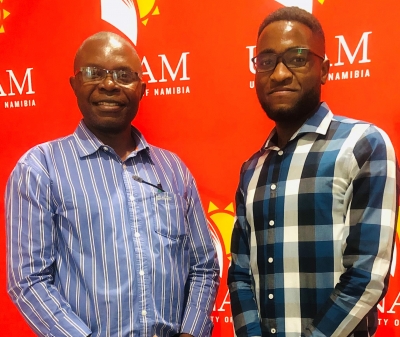Achieving a goal and fulfilling a dream


A/Professor Denis Kalumba with Shade Muluti
Shade Muluti’s a master’s student in civil engineering gives his account of what his journey has been over the past two years during the COVID pandemic.
It’s true what they say; you never know how significant a moment is until it passes. With me now having completed my studies at the best-renowned university in Africa and with my graduation coming up, I have not only achieved a goal but fulfilled a dream I long had.
Twenty years ago, I never knew my life would be like this; coming out of high school, I didn’t think I would get this far, and a year and a half ago, I didn’t believe I would complete my studies on time, let alone make it out the year sane. Like many of us, the Covid pandemic hit us hard and swiftly; it affected us in ways we didn’t think was possible. While many people were worried about getting infected, I was worried about whether I would be seeing my family again, especially my grandmother. She was in Namibia, and with borders closed, I felt helpless in my time of need.
Things only got worse for me as the university completely shut down, nobody was allowed on campus, and I needed to do my lab experiments during that period. Back at home, all I kept receiving was worrying news; my family and friends started getting infected. With each call and message coming from across the border, sending me in a deeper state of worry and fear, it didn’t help that one of my housemates tested positive, effectively sentencing all four of us to our rooms for self-isolation.
Academically I was disconnected from my studies as the university extended its lockdown, effectively putting an end to my hopes of completing my studies within the stipulated time frame. As a slap in the face, the university couldn’t procure the materials I needed for all the necessary lab work due to the nationwide lockdown.
My sponsorship was temporally halted from across the border as the country went into a total shutdown. I had no communication with them; I had no communication with anyone, alone and isolated in a foreign country. In these weeks, I finally understood the need for support for expats and international students; I have never felt so mentally and emotionally empty and defeated during that time.
My grandmother’s words finally took on a new meaning during my time of solitary, and she always used to say, ‘You only lose the cattle when you stop looking for them”. I had no intention of losing my cattle, especially while being far from home. So, I did what I always did when faced with challenges, I buckled down and continued to work hard on my thesis write up during lockdown. I worked harder than anyone I knew because while I worried about my family and friends, I knew they worried about me too.
Fortunately, the university offered a chance to return to campus for postgraduate students, and I continued with my lab work. I was fortunate to have Prof. Kalumba as my supervisor, guide, and mentor. He helped me make up all the time I lost by working overtime and trying to overcome challenges of load shedding which affected my test setups that needed to be continuously running for up to at least 36 hours. However, it seemed the harder I worked, the luckier I became and the better I felt, physically and mentally.
I finally completed and submitted my thesis on time and passed my degree with a distinction in my dissertation and coursework. Before I knew it, two and a half years had been turned into a memory I will forever cherish as I look back. I had found my cattle, fulfilled a promise and a dream I long had, dedicating my thesis to my grandmother.
I stand on the shoulders of giants and could not have done this alone. My heartfelt gratitude goes out to Dr Petrina Johannes, the Associate Dean of the School of Engineering and the Built Environment and Dr Ing. Joachim Lengricht, the former Head of Department of Civil Engineering & Environmental Engineering at the University of Namibia, for taking a chance on me and providing me with this lifetime opportunity to pursue my masters at UCT. I would also like to acknowledge the financial support from the German Federal Ministry for Economic Cooperation and Development through its implementing agency Deutsche Gesellschaft für Internationale Zusammenarbeit and the Project “Transport, Mobility and Logistics”. I am also tremendously grateful to my co-supervisor, Dr Laxmee Sobhee-Beetul, whose attention to detail and positive criticism was key in completing my dissertation.
Much appreciation goes out to Annette and Harry, my Cape Town parents and landlords, for welcoming me with open arms and making me feel at home away from home during my entire stay in Cape Town. Special thanks to my sister Stacy, my best friends Olavi, Sean, Jovita, and Grant for holding my hand, offering continuous support and words of encouragement throughout my studies. Lastly, my gratitude goes out to Mr Beaven Sikanda, my uncle and father figure, whose tough love, mentorship, guidance, support, and wisdom have been key to the man I have become today. As for my grandmother, it goes without saying that this is for her, and I am not sure if words will ever be enough to thank her for what she has done for me and the amount of love and support she has given throughout my life, this is specially dedicated to her.